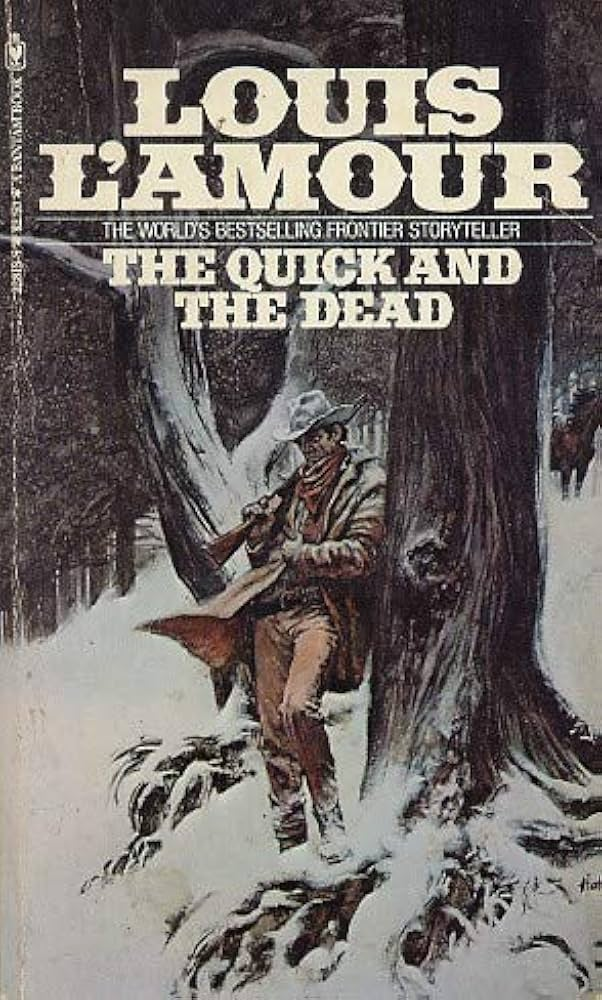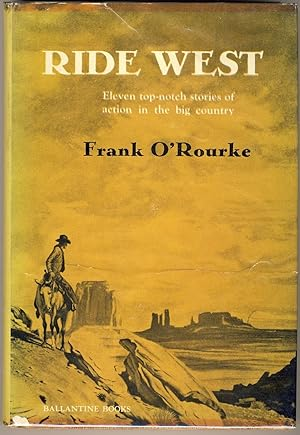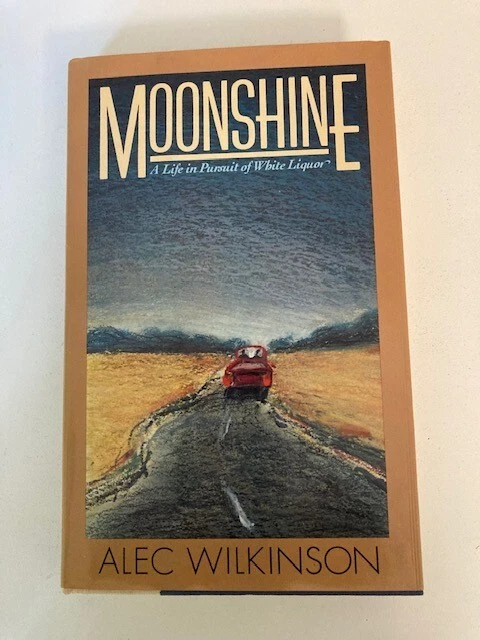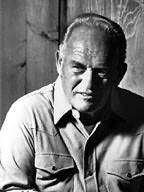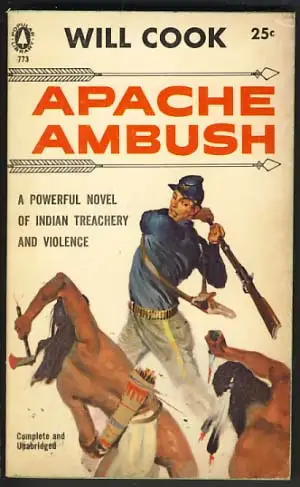“For some people
the term “frontier” may bring to mind only the way west. That is acceptable as
long as one remembers that everything from where the Atlantic Ocean breaks upon
the shore was at one time west. It was all frontier, and it is the entire breadth
of the continent from east to west that I’ve attempted to deal with in this
volume.”
That, my friends,
is but one treasured observation from this gorgeous volume from Mr. L’Amour,
one of his few non-fiction works. This work leaves me a bit wistful for what we
might have had if he had produced more in this contemplative non-fiction mode.
I offer copious
excepts from the text, but…the accompanying photos by David Muench make this
volume well-worth a look.
“Our country
was opened up and built by people unwilling to accept the horizons they were
offered: they had to push ever forward, trying to go beyond the limits
presented to them. They gave themselves many excuses for going--to settle upon
new land, to trap for fur, to dig for gold, but the real reason was their wish
to extend themselves to extend their horizons.”
·
To “extend horizons” is always the real
reason for “What’s next?”
·
For “What’s over that hill?”
·
If we trod repetitively in the same
paths, feel secure only in the ruts of “I eat at these restaurants, I watch
these shows, I only go out in this weather, I need these policies I was hereto
before now unaware of to be in place forever” to feel secure…
·
If we have no urge for the new, for a
wee bit of risk, if we are unwilling to sample change without a whine or a
complaint we are demanding that horizons remain unchanged.
·
We cannot claim intrepidity and stasis
at the same time.
·
If we desire no extended horizons, we
have not extended the self.
Europeans
traveling in rural areas expected subservience but found an irritating
independence, failing to understand that what they were encountering was a new
sort of man. Europe had for hundreds of years been a relatively settled
society, changing slowly and according to patterns known and accepted. Such was
not the case on the frontier. The pioneer had to constantly adapt to changing
conditions or to peace or war with various tribes of Indians. He not only
considered himself as good as any man but had proved that under the harshest
conditions.
·
The democracy of ability, equality via
action not elevation via fiat.
Europeans
traveling in the backcountry often found themselves treated rudely or with
indifference. Dismounting at a tavern, they rarely saw anyone come forward to
take a horse to the stable or carry their luggage inside. When some bystander
was asked to take a horse to the stable, more often than not would either stare
with contempt or reply with some rude comment. For the most part men stabled
their own horse on the frontier took care of their own gear.
·
“ Ask not what” rendered in the small
everyday actions.
Sod houses could
be warm and snug. Often when visitors were expected the earth floor would be
sprinkled with water and tamped hard; then with a small stick or other
instrument a design would be traced, resembling a carpet. The design would not
last long but would, for the first comers at least, add a pretty touch to the
bleak surroundings.
·
The surge for beauty and improvement no
matter the circumstances.
The country into
which they ventured was rich with wild game, edible plants, fish leaping from
streams. The Long Hunter was only secondarily an explorer, so he often lingered
for weeks and some likely spot where the fishing was good and life comparatively
easy. Our present conception of the importance of time [born in part from the
railroad timetable] had not come in to be. People lived and worked by the sun's
rising and setting, and when they paid attention at all, they judged longer
periods by the waxing and waning of the moon.
·
A creature of the Sun, Moon and Seasons.
·
Whereas, we have multiplied our masters
by adding slavery to matinee times, timetables, and the myriad stopwatch additions
of the day.
Education is of
many kinds, and these boys went to school with Nature, learning to read a trail
as a modern man would read his newspaper, and reading the forest itself just as
well, knowing its plants and animals, the way of the insects and the birds, and
where to find springs. Any of the girls could have done as well had they been
called upon, and there were some who proved it in escaping from Indians. At a
later time Annie Oakley became famous for her shooting, her skill acquired in
just that way, but in an earlier time there were girls in every hollow who
could have done as well or nearly as well. Marksmanship was not a pastime or an
entertainment, it was necessary for survival.
·
Education via immersive doing.
·
No YouTube tutorial then assuming, “Yeah,
I could do that.”
One estimate has
at the seventeen people died for every westward mile of the covered wagons. I
think the estimate is a modest one. So many died of whom there is no record.
Years later the remains of wagons might be found, merely a few scattered bones
and nothing to identify anyone. In one case, Captain Eugene Ware went on patrol
up Lodge Pole Creek found sixteen wagons, all neatly circled, grass growing up
around them, some weathered harness, wagons showing every evidence of having
been where they were for years. There was no food or ammunition left and the
trunks have been ripped open and hastily looted. No letters, papers, or any
marks of identification could be found. Although the story was widely reported
at the time, nothing ever came of it, and the wagons remain a mystery, the
owners vanished and unknown.
·
Standard human beings, not superheroes,
who desired something so dearly they uprooted and braved the harshest for the
dream.
·
How many of us can honestly claim we
would be among that stock that braved the journey?
All things
change in the mountains. Sand becomes sandstone and then quartzite; gravel
becomes conglomerate and then gneiss; mud changes to shell, to slate, and then
to schist; shells change to limestone and then to marble. Nothing remains the
same as the years become centuries and the centuries, millenniums.
·
I love the long perspective, one
informed by understanding the natural processes around the Man.
·
The more blind we are to what we see,
the more ignorant we are of the “How” of what we see the less depth we see in
the beauty.
Often I hike the
mountains and desert, but when along I do more loitering than hiking. When one
adopts a goal that is miles away one misses too much. If one is to understand
and appreciate the wilderness one should stroll along, pause, sit down for a
while and just absorb what there is to see, to hear, to smell. Walking too fast
one misses too much. If you see a wild animal at such a time it is strictly by
accident. If you sit quietly and make no sound they often appear. I had a deer
come to feed within 50 feet of me when I was downwind of them.
·
Elemental. A Man. A Stroll. An Environment.
·
No speed, no timetable, no phone to
steal life.
The mere fact
that you do not see animals does not mean they are not present. Usually they
see you first and quietly disappear into the landscape. From time to time a
would-be explorer goes into the jungle or mountains searching for some strange
animal of which he has heard. A few weeks later he returns saying there is no
such beast because he found none. I have spent years in mountains where there
were mountain lions, yet the only two I have seen were treed by dogs.
·
Even a watchful Man may not see it all.
·
Are we as watchful as He?
A man traveling
wild country in the old days always kept his eyes open for possible camping
places, not only for the immediate journey but for some future time. Those
things essential for a camp--shelter from the wind, fuel, and water-- were the
same essentials for the Indian or for prehistoric, and often on the sites
chosen I have found evidence of previous use, sometimes from the pioneer years
or earlier.
·
I can vouch for this.
I have located many a pocket Sinagua ruin, campsite, and, in some cases entire
villages in canyonland by simply asking myself, “Where would I receive the most
sun? What’s the closest water run-off on this redrock shelf? Where are the
closest game trails?”
·
The following observations double-down
on the wisdom of following the footsteps.
Unfortunately,
much of the knowledge of terrain acquired by mountain men in the course of
their hunting and trapping was never written down, for the simple reason that
it seemed too obvious. By simple observation they learned to read the land, to
tell directions by plant growth or by melting snow, and to find the easiest
routes of travel.
Buffalo and
other wild game had found the best trails long before any white man and
probably before any Indian. Engineers who came to layout roads or railroads
usually found they could not improve on buffalo trails, which always followed
the easiest route.
In travelling
wild country it is always best to stay with the trail, for a trail is always
going somewhere it's usually the shortest route between points. Whenever I have
left a trail, except for a bit of exploration, I've gotten into trouble. Once,
following a long, winding trail I came up on a long, beautiful slope of grass
leading down to the very point where I wish to go. The car waited for me down
there, and the trail led off in a roundabout way, so I decided on the shortcut.
I was tired. It had been a long day, and the easy way down the grassy slope was
inviting. After nearly two miles I came suddenly to a deep canyon, dropping
sheer for 300 feet, and no way down. Across the canyon that nice grassy slope
continued, I had to walk all the way back to the trail, and it was all uphill.
Common sense should have told me that had there been an easy way down others
would have used it.
Nobody knows the
wild country. No matter how long one lives in it and with it one is forever
learning, and there's always much to see and hear. Nor are any two places the
same.
·
Deep meaning in that preceding extract.
Profound.
Much of what one
gets from the wilderness depends on what one takes to it. By this I mean that
the more that is known of simple geology, of plant growth, and so on, the more
interesting an area becomes. The point is not only to see what is there but to
know what is happening and what has happened. Soon one is able to travel the
country with an awareness impossible before.
If you believe
the wilderness is gone you are mistaken. It is out there, miles upon miles of
it.
[On being picked
up after a week alone in the mountains.]
“Must have been
quiet,” he said. “How can you stand being alone?”
“I wasn’t
alone,” I said, “I had a mountain with me.”
The greatest
stories ever told are those around campfires, and bunkhouses, or in ship
fo’c’stles with a bunch of wandering men. They'll have dropped their anchors in
forgotten coves and paddled canoes up nameless creeks, and the best of the
stories are always for each other, for the ones who have not known the life
will not believe what they are hearing.
·
Dead on!
·
Stories from those who have lived, who
have dared trump those who have only viewed the YouTube video, read the article
or had AI read it to them.
·
Find your Wanderers, converse with
them.
·
Better yet, ask to go with them on their
next excursion, even if it’s a mere trip to the local BBQ, these people, my friends,
these people have stories.
·
They will not regale you with last
night’s Netflix binge, this morning’s headlines, or yesterday’s scores.
·
They are too busy living to speak spectator
tales.
The more we
learn of the world the more we should be cautious about our statements on the
past. So much of what we believe is theory or founded upon theory, and much of
such theory is based on insufficient evidence. The greatest danger lies in
accepting a theory for fact and building mountains of learning on insecure
foundations.
·
Sage advice to the cocksure on any
topic.
·
And…his cherry on top.
One has to begin
somewhere and a theory is such a place, but a theory can be a trap and is not
to be trusted too much.
·
This may be non-fiction but it is
easily my favorite work of Frontier literature from Mr. L’Amour.
·
Simply superlative.




